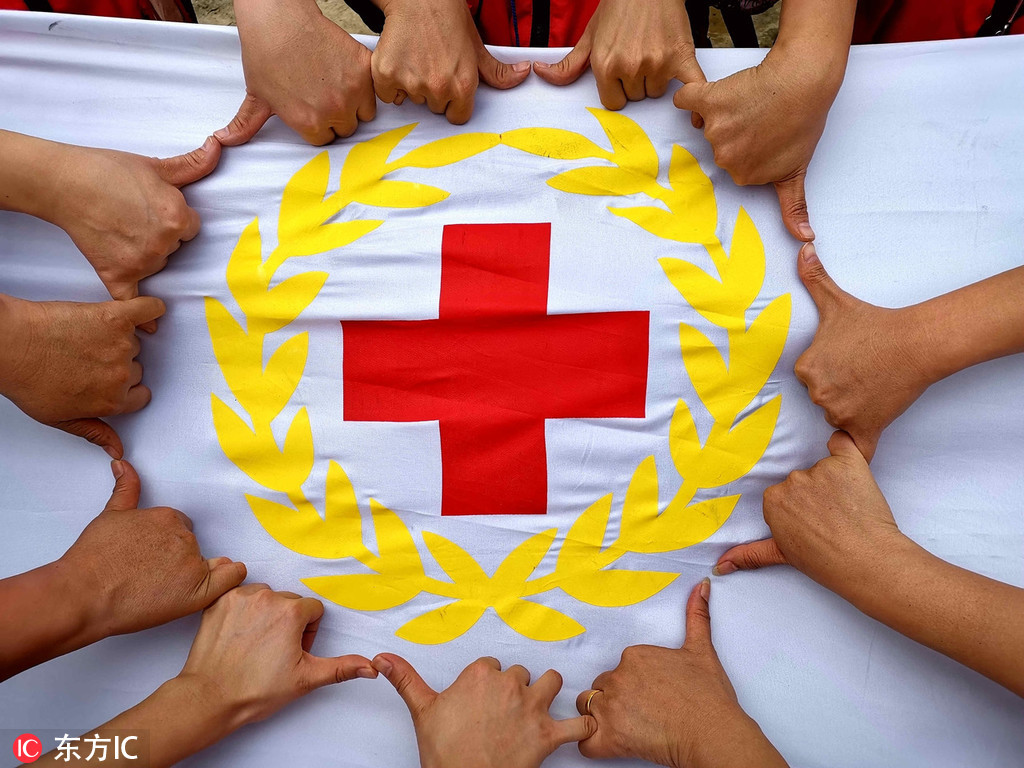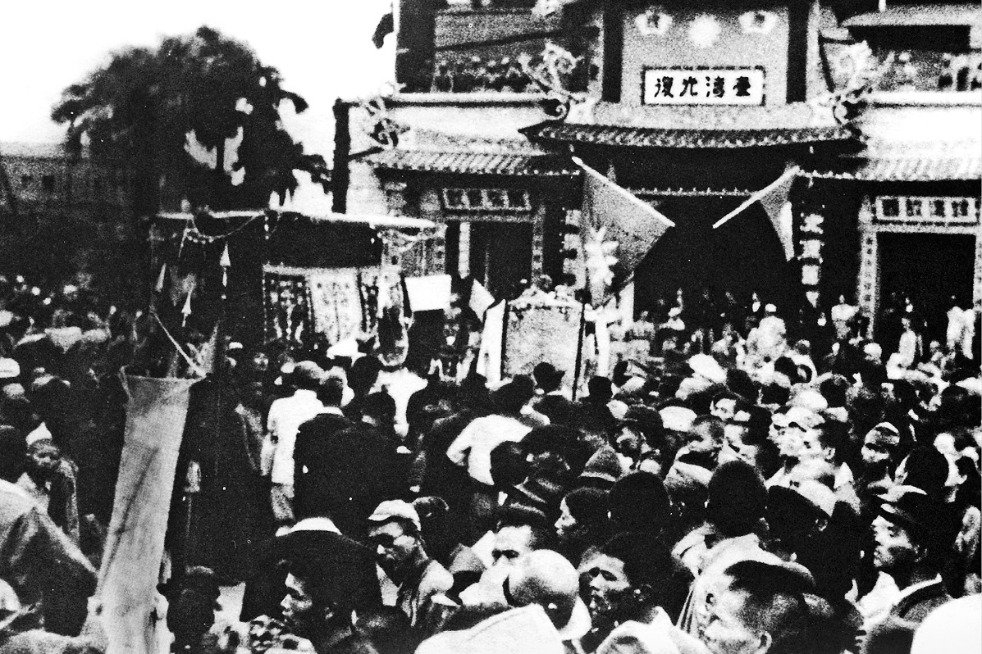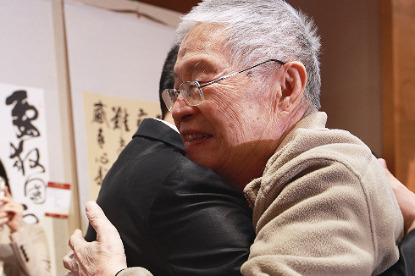Blood donation: from minority choice to mainstream activity


A growing number of people are donating to help society. Wang Xiaoyu reports.
In early December, Liu Peipei, a sophomore at Tsinghua University in Beijing, used her phone to register for an on-campus blood donation session the following week.
The registration system, embedded in the university's official app, was designed by a computer engineering major in 2014 to assist the growing number of students donating blood.
"Making a donation is on my year-end wish list," Liu said. "I needed to act fast because the places were quickly snapped up."
The Beijing Red Cross Blood Center dispatches two bloodmobiles to the university on five separate days every year.
"Each session attracts at least 300 donors, and one time there were more than 1,000," Liu said.
A decade ago, an online registration system for blood donations would have been deemed over-the-top because only a small number of students gave blood.
The upsurge seen at the university is indicative of the progress China is making in the transformation of blood donation from a minority choice into a mainstream activity.
Before the Blood Donation Law took effect on Oct 1, 1998, the country's blood transfusion program was rocked by a scandal in which tens of thousands of people were infected with HIV after being given tainted blood bought from unauthorized, unscreened donors.
The law stipulated that an altruistic donation system should be implemented. It also prohibited the commercial provision of blood to ensure that it was not viewed as a commodity, but as a gift, and foster a greater sense of social responsibility.
About 15 million donors provided 4,960 metric tons of blood in 2017, compared with 800 tons from 328,000 people in 1998, according to the National Health Commission.
Meanwhile, the 2016 Global Status Report on Blood Safety and Availability, published by the UN at the end of 2017, showed that China has strengthened safety checks on donations, while implementing a full range of tests at blood banks and adopting safety standards equal to those in developed countries.
Regional regulation
Shenzhen, in the southern province of Guangdong, has been the lodestar of China's economic growth in the past four decades. It was also the birthplace of the first regional regulation on altruistic blood donation, which came into force in November 1995.
"For a while, we were unsure about the altruistic approach, and detractors questioned if such a method was actually feasible in China," said Lan Yuxiao, from the blood donation department at the Shenzhen Blood Center.
The questions were not without foundation, because in the early and mid-1990s, compulsory donations by college students and civil servants was a common way of maintaining blood stocks, she said.
On May 8, 1993, the city launched its first official drive to promote voluntary donation, but only four people arrived to sign up. The next day, only one of them showed up as promised to give blood, Shenzhen News.com reported.
The uninspiring start didn't dampen enthusiasm, though. Two years later to the day, the center introduced the city's first bloodmobile.
"We were nervous at the beginning, but the donors gathered around the vehicle were quite enthusiastic. They offered a glimmer of hope and encouraged us to continue our work," Lan said, adding that 34 people made donations during the bloodmobile's maiden trip.
From 1995 to 1998, the center ramped up its facilities, including four new bloodmobiles, to accommodate the growing number of donors. In October 1998, Shenzhen became the first city to provide blood for clinical use solely through voluntary donations.
When recalling the tough times, Lan conceded that the idea of rewarding donors with money and/or goods flickered through her mind. "But we agreed to honor the principal of altruistic donation and never provided any form of reward," she said.
Instead, her publicity work focused on enhancing a sense of pride and joy at extending a helping hand to those in need.
"The goal was to emphasize that donating blood is an honorable thing to do and should be voluntary, and also to break the link between donating blood and receiving a reward in terms of cash or paid leave," she said.
She noted that by the 1990s, many countries had already implemented a policy of voluntary blood donations.
"Only in this way can we ensure safety from the point of origin (the donor's vein) because people who give blood out of self-interest are prone to conceal health problems, such as hepatitis, AIDS and other infectious diseases," she said.
That message was echoed by Zeng Jinfeng, Lan's colleague and head of the center's clinical laboratory, which monitors the safety of donations.
Zeng said that despite the use of advanced technology that weeds out unauthorized donors and identifies contaminated blood, a number of viruses are beyond the scope of the lab's tests.
"It is crucial that we guarantee blood safety from the point of origin. It's the most efficient and effective way," he said.
The introduction of the Blood Donation Law forced cities nationwide to adopt fresh measures.
On Dec 13, the National Health Commission confirmed that all blood for clinical use is now acquired solely through voluntary donation.
Incentives
However, people who work in blood centers still dispute what constitutes an altruistic blood donation - is it the amount of satisfaction gained or the incentives offered to donors?
Shenzhen holds regular ceremonies to give commemorative badges and official thank-you letters to donors after their 50th, 100th and 200th contribution.
Meanwhile, the Beijing Red Cross Blood Center offers a seven-day medical insurance program for donors, beginning the day the blood is collected, to provide a safety net in the event of an adverse reaction.
Small gifts are popular at most blood collection facilities. For example, at Tsinghua University student donors receive scarves embroidered with the Red Cross symbol to mark their participation in on-campus blood donation sessions.
However, some people are concerned that offering incentives, ranging from paid leave to school credits, risks reverting to the discredited system of paid donations.
For example, Xinlian College, which is affiliated to Henan Normal University in the northern province of Hebei, sparked controversy when it announced that students who give blood will be awarded an extra 30 school hours, amounting to two or three credits, Henan Daily reported in June.
A sophomore at the university, who spoke on condition of anonymity, said she noticed a rise in the number of her peers searching for information about donating blood after the announcement.
"Nobody said flat out that they donated to earn the credits, but honestly, it felt like a tacit agreement when I lined up for the bloodmobile with my classmates," she said.
Also, regulations in Qinghai, Hainan and Yunnan three provinces stipulate that residents are entitled to one or two days paid leave after they give blood.
Despite the national guidelines, some companies are not only often providing extra paid leave, but are also offering small amounts of cash.
Hou Minghao, a white-collar in a tech company in Xingtai, Hebei province, said he donated blood in return for five days paid leave and 500 yuan ($72.50).
"It's hard to resist when a package of paid leave and cash rewards is dangled in front of me," he said, adding that he would probably not donate if the incentives were less appealing.
Sense of satisfaction
Liu Jiang, director of the Beijing Red Cross Blood Center, said the center has been working to determine "an appropriate degree of reciprocity for blood donors" with the China Institute for Philanthropy and Social Innovation at Renmin University of China and the Chinese Academy of Social Sciences.
"One research paper suggested that the value of the combined material rewards, cash and gifts, should not exceed one-third of a donor's daily income," he said, adding that the authors attempted to classify prospective donors by age, profession and location.
"For instance, some give blood for the sole purpose of helping society, while others take the perks into consideration," he said.
"An ideal scenario would allow us to tailor our publicity efforts and donation policies to suit."
However, these studies often fail to gauge the satisfaction a person can gain from helping others by donating blood, he added.
The Capital Volunteer Association for Blood Donation, affiliated to the center, has a list of about 70,000 frequent donors in Beijing. It has organized events for them, including jogging events in forest parks.
"More than 400 donors and their families joined us, and I was amazed at the intensity of the bonds we have built through blood donations," Liu Jiang said.
The same sense of social engagement and belonging thrives on the campus of Tsinghua University.
Cao Yuli, head of the student branch of the Tsinghua University Red Cross Association, said donating blood is the norm and a culture on campus.
"Encouraging students to donate blood contributes to fostering the spirit of charity as part of our college education. When one stands in line with hundreds of other students, chatting while waiting, the ambiance is more intimate than heading for a street bloodmobile alone," she said.
"We are proud of donating blood. We also take pride in donating as Tsinghua students."
- Beijing steps up winter heating preparations
- 2025 Xinjiang Tacheng Baktu Forum opens, strengthening regional cooperation
- First satellite produced in Xiong'an marks industry milestone
- New endoscopic tech for complex spine surgery attracts global experts
- ASEAN+3 STEM competition launches in Chongqing
- Mainland to enhance exchanges with all political entities in Taiwan





































